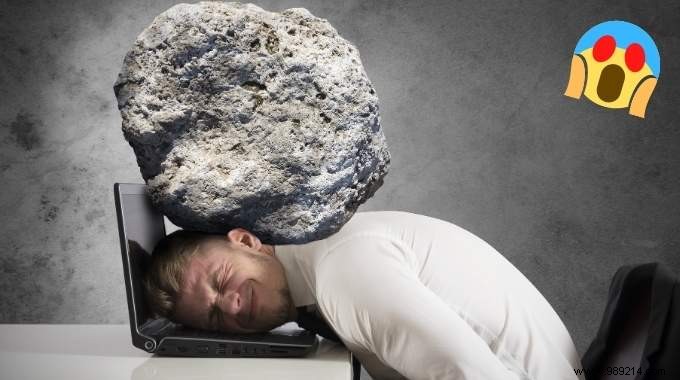
That's it, containment is back!
Work, children, money... the list of sources of stress is growing.
This is where the hypothalamus, the "control tower" of the brain comes in.
Faced with stressful situations, his reaction is to let go of the stress hormones.
Instantly, you feel your heart beating, your breathing quickening and your muscles contracting...
This response helps protect your body in the event of an emergency or threat, preparing it to react as quickly as possible.
But when stress is repeated day after day, it harms your health . Here are all the effects of stress on your body :

Click here to easily print this guide in PDF.
Migraines :stress can trigger and aggravate headaches.
Depression :Chronic stress is emotionally draining and can lead to depression.
Heartburn :stress increases the production of stomach acid, which can lead to and worsen heartburn.
Insomnia :Stress interferes with falling asleep and sleeping, which can lead to insomnia.
Accelerated breathing: when you're under stress, your breathing muscles contract, which can lead to shortness of breath.
Immune weakness: chronic stress weakens the immune system, making you more vulnerable to viruses and infections.
Heart complications: over time, rapid heartbeat and high blood pressure damage the arteries, which can lead to a heart attack.
Hyperglycemia (blood sugar): when you are under stress, the liver increases the production of glucose in the blood, which contributes to the development of type 2 diabetes.
Heart beating too fast: stress hormones make your heart beat faster to send more blood to your limbs and vital organs.
High blood pressure: stress hormones constrict blood vessels, which can raise your blood pressure.
Fertility problems: stress disrupts the reproductive system in both men and women, reducing the chances of conception.
Stomach pain: stress hormones disrupt the digestive system, which can lead to stomach upset, nausea, and other stomach upsets.
Erectile dysfunction: stress is one of the psychological factors that can cause erectile dysfunction.
Low libido: stress, often accompanied by fatigue, leads to a decrease in libido.
Irregular periods: stress hormones can disrupt your menstrual cycle or, in some cases, lead to a missed period.
Muscle tension: in chronic stress, muscle tension leads to migraines and muscle aches.

Stress is a physical and mental reaction natural in the face of life's experiences.
Everyone experiences stress from time to time!
Whether it's daily responsibilities like work or family...
Or serious events such as health problems, war or the loss of a loved one...
There are a large number of situations that can trigger stress.
Stress is sometimes beneficial, even necessary, especially in situations that require an immediate or short-term reaction.
Thus, stress can help you cope with potentially dangerous situations.
Your body reacts to stress by releasing hormones that increase heart and breathing rates and oxygen supply to the muscles.
However, if this physiological reaction persists and your stress levels remain high for longer than necessary, it can damage your health !
Indeed, chronic stress can not only affect your well-being, but also lead to many health problems.
The most common symptoms of chronic stress are:
- irritability
- anxiety
- the Depression
- headaches
- insomnia

Your central nervous system (CNS) is responsible for the body's "fight-flight" response to danger.
In the brain, it is the hypothalamus that triggers the reaction, signaling the adrenal glands to release adrenaline and cortisol.
These stress hormones make the heart beat faster , with the aim of sending more blood to the muscles, heart, vital organs and other areas of the body that need it most in times of danger.
Once the danger is under control, the hypothalamus should theoretically signal all of these systems to return to normal.
But if this is not the case, or if the source of the stress does not disappear, then these physiological reactions continue.
Be aware that chronic stress is also linked to behavioral disorders, including eating disorders, alcoholism, drug addiction, and social isolation.
To discover: 5 Brain Dancing Benefits Nobody Knows About.
Stress hormones also affect the respiratory and cardiovascular systems.
During the physiological reaction to stress, breathing is accelerated in order to distribute oxygen-rich blood as quickly as possible through the body.
If you have a breathing problem like asthma or emphysema, stress can make it harder to breathe .
Moreover, when you are under stress, your heart will also beat faster.
Under the effect of stress hormones, your blood vessels constrict, in order to divert more oxygen and energy to the muscles.
But this tightening also increases your blood pressure .
Therefore, frequent or chronic stress causes your heart to work too intensely and for too long intervals.
In addition, high blood pressure also increases the risk of a stroke or heart attack.
To discover: 5 Super Foods That Lower Hypertension.
When you are under stress, the liver increases the production of blood sugar (glucose) to provide an energy boost to your body.
But when it comes to chronic stress, the body cannot adapt to frequent spikes in blood sugar.
This is why chronic stress contributes to the development of type 2 diabetes .
Rapid heart rate, rapid breathing, and the effects of stress hormones can also upset your digestive system.
And due to increased acidity in the stomach, you are more at risk of acid reflux or heartburn .
Be aware that stress in itself does not cause ulcers, which are most often caused by a bacterium, Helicobacter pylori .
However, stress increases the risk of developing an ulcer and can aggravate an existing ulcer.
Stress can also affect transit, leading to diarrhea or constipation.
Finally, people under stress can also suffer from nausea, vomiting and stomach pain.
To discover: Difficult digestion? Two Grandma's Remedies to Drink to Aid Digestion.
When you are stressed, muscles contract to protect the body from injury.
Once the stress is gone, the muscles relax naturally.
But if your body is constantly under stress, your muscles can no longer relax.
However, muscle tension causes headaches, pain in the neck, back and shoulders, and muscle pain in general .
Over time, these stress-related pains can create a vicious cycle.
Indeed, some people stop playing sports because of the pain and take painkillers to relieve it.
To discover: 20 Natural Painkillers You Already Have in Your Kitchen.
Stress is exhausting, both for the body and for the mind.
It is common for those who are constantly under stress to experience a significant loss of libido .
Certainly, in men, short-term stress increases testosterone production, but this effect is not long-lasting.
Indeed, in the event of prolonged stress, testosterone levels can drop in men.
Therefore, it can disrupt sperm production and cause erectile dysfunction .
Chronic stress also increases the risk of infection of the male reproductive organs, including the prostate and testicles.
In women, stress can disrupt the menstrual cycle , resulting in irregular, heavier and more painful periods.
Chronic stress can also amplify the physiological symptoms of menopause.
To discover: The 4 Natural Ingredients to Boost your Libido.
Stress stimulates and strengthens the immune system, which is of considerable benefit in the face of immediate danger.
Strengthening the immune system can help you avoid infection and heal wounds more easily.
But over time, stress hormones can instead weaken your immune system, and therefore weaken your body's immune response to foreign objects.
Thus, people under chronic stress are more likely to contract a viral disease, such as the flu, colds and many other infections.
Stress can also slow the healing of illnesses such as wounds.
To discover: 11 Foods To Strengthen Your Immune System and Improve Your Health.